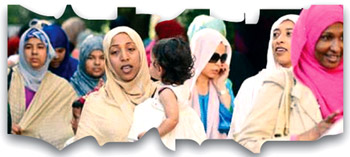|

Significant feature of modern marriages - early
termination:
Shorter shelf life for true love?
Aditha DISSANAYAKE
 If you are a fan of “Zobra the Greek,” you would have heard this
already. Chances are you probably remember the lines verbatim too.
Anthony Quinn, playing Zobra describes his devastating married life: “Am
I not a man? And is a man not stupid? I’m a man, so I married. Wife,
children, house, everything. The full catastrophe.” If you are a fan of “Zobra the Greek,” you would have heard this
already. Chances are you probably remember the lines verbatim too.
Anthony Quinn, playing Zobra describes his devastating married life: “Am
I not a man? And is a man not stupid? I’m a man, so I married. Wife,
children, house, everything. The full catastrophe.”
This was in 1964. More than forty years later, in the movie
adaptation of Elizabeth Gilbert’s “Eat, Pray, Love” the main character
Liz Gilbert (Julia Roberts) talks about another kind of catastrophe. A
married woman who seemingly has everything she could ever want, she yet
realizes how unhappy her marriage really is and that life needs to go in
a different direction. “The only thing more unthinkable than leaving was
staying; the only thing more impossible than staying was leaving.” The
catastrophe here is not marriage, but its early termination – divorce.
Ordinary
In the modern world this is apparently an ordinary, everyday
occurrence. It seems probable that even as you meet your significant
other, fall in love and plan your “happily ever after” wedding, even as
you take your marriage vows (“Do you take this man or this woman to be
your husband or your wife, to have and to hold... till death do you
part?)in the back of your mind you are thinking, “sure I take this
person. But if it does not work I will file for a divorce and get on
with my life.”
 |
|
Where has
all the love gone? |
If you had these thoughts in the back of your mind, on your wedding
day, or secretly harbor them till you make the plunge, you are not
alone. Statistics reveal nowadays, 60 per cent of marriages ends in
divorce. Instead of the conventional “till death do us part,” it seems
to be divorce that makes most couples apart today.
Finding answers
What are the reasons that have made people so intolerant that they
are at the divorce court fighting over small details such as not folding
the Sunday newspapers properly or sharing household responsibilities?
Where does all the love and understanding go when the couple is
constantly bickering and not ready to make allowances for each other?
Does the shelf life of true love keep getting shorter and shorter?
So many questions. Who has the answers? Perhaps feminism is to blame
for the fragile state of the institute of modern marriages. Yes, says
historian and feminist writer Stephanie Coontz.
She thinks feminist reforms gave women the opportunity to get out of
unhappy or unfair marriages, and in that sense feminism was the catalyst
for many divorces in the 1970s and 1980s. “Once feminist reforms gained
women access to better jobs and outlawed discrimination in pay, hiring,
and promotions, women who were unhappy in their marriages no longer had
to stay married out of dire economic necessity.”
According to Coontz there was another way that feminism destabilized
marriage. When women went to work in the 1970s, whether from necessity
or choice, they began to feel entitled to ask their husband to do more
at home, and when their husbands resisted they felt entitled to press
the issue, instead of “gracefully giving in,” as the advice books of the
1950s had advised wives (but not husbands) to do in case of
disagreement.
It is probable that feminism initially led to more outright conflict
in marriages because women felt less pressure to simply put up with bad
behavior or an unfair division of labor.
Feminism though is not entirely to blame. Part of the blame should go
to the way human beings are wired. This is why though in fairy tales,
marriages last happily ever after in real life science, tells us wedded
bliss has but a limited shelf life. Research reveals newlyweds enjoy a
big happiness boost that lasts, on average, for just two years. Then the
special joy wears off and they are back where they started, at least in
terms of happiness. This is when many couples mistake the natural shift
from passionate love to companionate love for incompatibility and
unhappiness and decide to go separate ways.
“Working together”
As Sonja Lyubomirsky, professor of psychology at the University of
California, and the author of “The Myths of Happiness” says “We move
into a beautiful loft. Marry a wonderful
 |
|
Marital
status – divorced |
partner. Earn our way to the top of our profession.
How thrilling! For a time. Then, as if propelled by autonomic forces,
our expectations change, multiply or expand and, as they do, we begin to
take the new, improved circumstances for granted.”
Prof. Lyubomirsky does not mince her words “It’s cruel but true:
We’re inclined — psychologically and physiologically — to take positive
experiences for granted.”
This is so, because although we may not realize it, we are
biologically hard-wired to crave variety. Evolutionary biologists
believe that when your spouse becomes as familiar to you as a sibling —
when you become family — you cease to be attracted to each other.
This could be why even when you love someone deeply and feel you are
ready even to die for that person, you still feel trapped and need to
propel your life in a new direction.
Is there then, no key to keep a marriage from crumbling? According to
Linda M. McCloud, author of “Top Reasons People Divorce” there is no
one key. But several sets of keys. “They work together in harmony.”
Notice the phrase she uses is “work together” because that is what
marriage is - two people working together for a lasting future.”
Could Oscar Wilde have known better when he said, “Marriage is the
triumph of imagination over intelligence.” Perhaps.
[email protected]
Ethnic minority women face job crisis in UK
Women remove hijabs or make names sound more English to beat
discrimination, says parliamentary report Large sections of minority
ethnic women are more than twice as likely to be unemployed as their
white counterparts, with some removing their hijabs or making their
names sound more English to try to beat discrimination, a report from
MPs and peers says.
Furthermore, the rate of joblessness for ethnic minority women has
failed to come down in the past three decades, finds the report from the
all-party parliamentary group on race and community.
 |
|
Muslim women celebrate Eid al-Fitr at
the Regent's Park Mosque in London. AFP |
The report finds that prejudice and discrimination explains a quarter
of the higher unemployment rate faced by women from Pakistani,
Bangladeshi and black communities.
The report finds some employers assume Muslim women would stop work
after having children and the MPs and peers say the government must end
its “colour blind” approach to improving employment equality.
The report from the cross party group is an attempt to put
discrimination issues back on the agenda, coming at a time when the
official equalities watchdog, the Equality and Human Rights Commission,
is facing large budget cuts and criticism over its effectiveness.
Affected categories
The report found: “Pakistani and Bangladeshi women are particularly
affected, with 20.5% being unemployed compared to 6.8% of white women,
with 17.7% of black women also being unemployed.”
The higher unemployment rate covered all ages, dashing hopes that
more enlightened attitudes mean the problem is lessening for younger
women.
The report cited research from Professor Anthony Heath of Oxford
University: “The unemployment rate of black women has remained at
roughly double that of white women since 1972.
There has been no decrease over time or over generations in ethnic
minority unemployment rates overall (both men and women), and that the
second generation still experience unemployment rates which are as high
as those of the first generation.”
Research by Professor Yaojun Li found the same was true for
predominantly Muslim Pakistani and Bangladeshi women trying to find
work: “After 1983 the unemployment rate of Pakistani and Bangladeshi
women has remained consistently and substantially higher than the rate
for white women.”
The report found:
* Some employers’ attitudes worsened when they realised women with
European-sounding names were black.
* Some Muslim women were removing their hijab to increase their
chance of getting work.
* Black and Asian women complained of being asked during job
interviews about their plans for marriage and having children.
* Fewer Pakistani and Bangladeshi women were taking up their
children's free nursery places than white women.
Reluctance
The report found ethnic minority women “deselecting themselves” from
the job market and deciding not to apply because of the extra barriers
they faced.
The MPs said the approach of successive governments must change: “We
believe that evidence shows that there are varied and complex barriers
facing Black, Pakistani and Bangladeshi women which are different from
those facing white women or ethnic minority men. “Based on this, we
would argue that the government's ‘colour-blind’ approach to tackling
unemployment is not appropriate in dealing with the specific issues
facing women from these groups.”
Labour MP David Lammy, who chairs the all-party group, said: “It is
staggering that in 21st century Britain there are women who felt they
had to remove their hijab or change their name just to be able to
compete on the same terms as other candidates when looking for jobs.
“All unemployment is tragic but we simply can no longer remain so
casual about women that are simultaneously the victims of both sexism
and racism when they are competing in the labour market.
www.Guardian.co.uk
|







